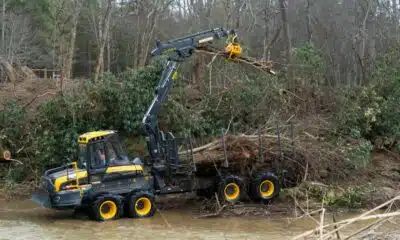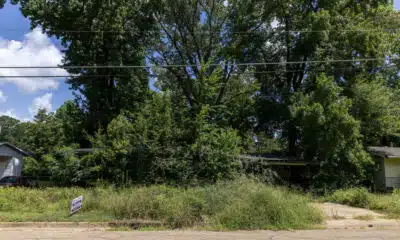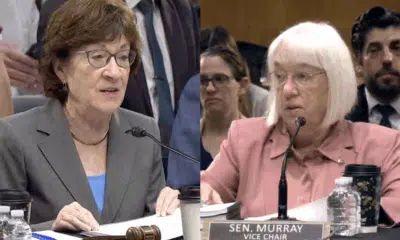News from the South - North Carolina News Feed
Cochran, former sheriff of Swain Co., NC, faces more legal trouble
Former Swain County Sheriff Curtis Cochran continues to fall deeper into legal trouble. Two weeks ago, he was arrested again and charged with second-degree forcible rape according to filings in Swain Superior Court.
The embattled sheriff left office last month after being arrested and charged in both North Carolina and tribal court for committing sex crimes against a member of the Eastern Band of Cherokee Indians.
Cochran faced state criminal charges of sexual battery, assault on a female, solicitation of prostitution and felonious restraint. He was indicted in Swain Superior Court on July 21.
[Subscribe for FREE to Carolina Public Press’ alerts and weekend roundup newsletters]
The Eastern Band of Cherokee Indians also charged Cochran with violations of the Cherokee Code for the same assault — one count of abusive sexual contact and two counts of oppression in office. The tribe can charge non-Indian perpetrators with certain crimes as authorized by the Violence Against Women Act in 2022.
The most comprehensive account of the investigation leading up to Cochran’s first arrest was included in District Attorney Ashley Hornsby Welch’s petition to remove Cochran from office, which was voluntarily rescinded after Cochran announced his retirement on July 3.
According to that complaint, a Cherokee woman reported to the police on June 22 that Cochran had sexually assaulted her and attempted to pay her for oral sex inside his own police vehicle. That prompted an investigation involving state and federal law enforcement. On June 23, a Cherokee Indian Police officer pulled over Cochran inside the Qualla Boundary and found him with another woman (not Cherokee) who later told investigators that she had been similarly assaulted.
Both women, according to the court filings, were picked up by Cochran on the side of the road under the guise of him offering them a ride.
Rape added to Cochran’s list of charges
The second degree rape charge involves a third woman not mentioned in previous court filings. She does not appear to be Cherokee, and no additional charges have been filed against Cochran in tribal court.
As of now, the details of this latest offense are sparse.
Cochran was arrested again on July 21 after being indicted on the rape charge — the same day that he was indicted for the four other charges brought against him. He was released on a $50,000 bond under the conditions that he would not leave the state, not contact the rape victim and not commit any more crimes.
All of the alleged assaults Cochran is accused of occurred in June of this year, and all three victims have previous arrest records with the Swain County Sheriff’s Office during the time that Cochran led the department.
Welch’s office declined to comment on whether they suspect that more women have been victimized by Cochran, but said that possible victims should contact the State Bureau of Investigation.
Ex-sheriff’s son involved in curious traffic stop
Travis Cochran, a trooper with the State Highway Patrol and son of the former sheriff, pulled over one of Curtis Cochran’s alleged victims on July 18 according to a publicly available court filing.
The younger Cochran assessed the woman a traffic violation for not wearing her seatbelt and wrote in the citation that there were “no problems” during the interaction.
The woman was named in the petition for removal as the non-Cherokee woman found in Cochran’s vehicle on June 23. He has not so far been charged in the alleged assault on her, but she was a witness in the investigation leading up to his arrest.
Unlike the other two named victims, there is no court order barring Cochran from contacting this woman. However, the incident does raise questions related to conflict of interests or potential witness tampering when it comes to Cochran’s criminal case.
The district attorney’s office declined to comment on the matter, stating that they did not comment on pending cases. Neither the State Highway Patrol nor Curtis Cochran, through his attorney, responded to inquiries from CPP prior to the publication of this article.
Curtis Cochran’s next hearing for the state criminal charges is scheduled for 10 a.m. on Sept. 24 at the Swain County Courthouse in Bryson City. He is set to make his next appearance in Tribal Court in Cherokee at 9 a.m. on Sept. 29.
This article first appeared on Carolina Public Press and is republished here under a Creative Commons Attribution-NoDerivatives 4.0 International License.
The post Cochran, former sheriff of Swain Co., NC, faces more legal trouble appeared first on carolinapublicpress.org
Note: The following A.I. based commentary is not part of the original article, reproduced above, but is offered in the hopes that it will promote greater media literacy and critical thinking, by making any potential bias more visible to the reader –Staff Editor.
Political Bias Rating: Centrist
The content is a straightforward news report focusing on the legal issues involving a former sheriff, Curtis Cochran, without evident editorializing or partisan language. It presents facts from official sources and court proceedings, maintaining an objective tone without endorsing or opposing any political ideology. The balanced presentation and lack of politically charged commentary indicate a centrist bias, aiming to inform rather than persuade.
News from the South - North Carolina News Feed
Asheville’s Urban Forestry Commission speaks for the city’s trees. It hasn’t met since Helene. • Asheville Watchdog
Asheville’s Urban Forestry Commission met on Sept. 3, 2024, with an agenda that, if unexceptional, represented the kind of work the volunteer advisory board had done since its inception at the beginning of the decade.
Its members heard an update from Keith Aitken, who a year earlier had become Asheville’s forester after the UFC successfully lobbied the city to create the position. They voted to recommend the approval of a landscaping plan for a Duke Energy substation on Rankin Avenue. And they discussed the Urban Forest Master Plan, for which City Council had approved funding that June. Local environmentalists, including the UFC, had long advocated for a roadmap for protecting and growing the city’s canopy; now one was finally on the way, with a public tree inventory and satellite analysis ready to begin.
Then Tropical Storm Helene tore the urban canopy asunder. In its aftermath, the city paused work on the Master Plan and indefinitely suspended all advisory boards, including the UFC.
Eleven months later, the UFC still has not reconvened, the Master Plan is still on hold, and their purgatorial state is causing growing alarm among advocates who see this period of recovery as a particularly crucial moment for Asheville’s trees.
Though local tree loss has not been thoroughly quantified, the North Carolina Forest Service has estimated that 40 percent of trees in Buncombe County but outside the city limits were damaged; one analysis of hundreds of fallen trees within Asheville found that the city’s medium-to-large hardwoods fared particularly poorly. Meanwhile, one of the city’s largest contiguous forested areas is on the chopping block, as the University of North Carolina Asheville is pursuing a proposal to replace 45 wooded acres with a 5,000-seat soccer stadium and surrounding development.

“Of all the times when you really need (a master plan), you’d think now would be the time, when we’re trying to think of how to prevent the next disaster caused by too much pavement and too much building and not enough stormwater absorption and not enough green infrastructure,” said Steve Rasmussen, a member of the volunteer Tree Protection Task Force for Asheville and Buncombe County, which has worked closely with the UFC.
When the UFC formed in 2020, it was part of a focus on trees that local environmentalists felt was sorely needed; a study commissioned by the city the previous year had found canopy loss of more than 6 percent coinciding with population growth over the previous decade. The UFC’s predecessor, the Tree Commission, had a narrower purview, as did the canopy ordinance the city had in place for decades. Between the UFC’s inception and the post-Helene pause, according to UFC documents, the city preserved more than 2.5 million square feet of canopy, planted about 400,000 more, and collected roughly $300,000 in fees related to landscape compliance rules.
Aitken, the city forester, was not available for an interview for this story, city spokesperson Kim Miller said. In an email, Miller pointed toward the creation of Aitken’s position and to the 2020 city ordinance that expanded canopy protections.
“The master plan contract remains in place as staff assesses the next best steps forward,” she said. “We will announce the restart of the planning process and opportunities for community involvement in the coming months.”
The UFC doesn’t have to meet for the plan to move forward; the city has already chosen its contractor and approved $269,000 in spending, and as an appointed advisory board, the UFC weighs in on city matters but doesn’t have decision-making authority.
But keeping the UFC dormant could deprive the public of an important conduit to city officials, one more powerful than sending an email or speaking for three minutes during a council meeting’s public comment section, Rasmussen said.
“It really helps to have an advocacy group, and for people in general it really helps to have a place to take their concerns about trees and tree protections and have them addressed. The UFC has been one of the most active of all these boards and commissions.”
Zoe Hoyle, the UFC’s most recent chairperson, said the advisory board could play an important role in engaging the public as the city continues to respond to Helene and, eventually, restarts the Urban Forest Master Plan.
“I think it’s really important that we do something that marks us out as a city” in Helene’s wake, she said. “‘Transformative’ is the word I like to use.”
Alison Ormsby, the co-chairperson of the Tree Protection Task Force, said she would have liked to see the UFC continue to meet after Helene — helping to steer the city’s recovery as it pertained to trees and green spaces and acting as a watchdog as criticism proliferated over the debris-removal practices of the U.S. Army Corps of Engineers and its paid-by-volume contractors.
“Eric North, a program manager for the Arbor Day Foundation, which administers the Tree City program, said in an email Asheville began its application last year but, like some other communities preoccupied by hurricane recovery, didn’t finish it. who could provide really useful input on storm response,” she said.
Future of city’s advisory boards uncertain
The UFC’s uncertain future is part of a bigger question the city now faces: What will it do about its many advisory boards? It had 13 active ones before Helene and two others that existed in name but hadn’t met for years. The boards have been paused largely because city staff hasn’t had time to help them run their meetings.
At a City Council meeting last week, city staff offered one path forward, a plan to keep the advisory boards on hold and reassemble some of their members into four so-called recovery boards. Assistant City Manager Ben Woody said the proposed arrangement would be more efficient, and eventually the individual advisory boards could still meet or take on tasks as the city wishes.

The city’s Boards and Commissions Realignment Working Group has proposed an alternate plan in which it would voluntarily help publicize and run advisory board meetings. Councilmember Kim Roney supported the idea, saying she believed it’s time for the boards to get back to work.
“I don’t know everything about everything,” she said. “But when we invite our neighbors to bring their professional and lived experience to the table, we can make better decisions as a council.”
But City Attorney Brad Branham threw cold water on the idea. Though he stopped short of shutting it down entirely, he said he worried about the boards inadvertently violating open meetings laws in the absence of city staff. Such an error could cause legal trouble for the city, he said.
Those close to the UFC hold out some hope that the city will entertain the Realignment Working Group idea. Hoyle said she has concerns about the recovery-boards plan. She believes UFC members would need seats on all four boards to be effective. (A draft Woody presented last week has UFC members on the proposed Economy and Infrastructure boards — but not on the People & Environment board.) And while advisory boards could still be called upon for occasional work, Hoyle worries the lack of regular structure would undermine that expectation.
“Our current members could lose interest and just disappear,” she said. “I don’t know what the mechanism will be for replacing our membership.”
To some observers, the progress on tree issues in recent years now feels fragile. Even Asheville’s Tree City USA distinction, which it held for nearly 45 years, has lapsed. Eric North, a program manager for the Arbor Day Foundation, which administers the Tree City program, said in an email Asheville began its application last year but, like some other communities preoccupied by hurricane recovery, didn’t finish it. He said the Foundation would welcome the city’s reapplication this year.
But to meet Tree City standards, Asheville would need a functional tree-focused board or department.
“We no longer fit the criteria,” Ormsby said. “Some folks have said we don’t deserve it.”
Asheville Watchdog welcomes thoughtful reader comments about this story, which has been republished on our Facebook page. Please submit your comments there.
Asheville Watchdog is a nonprofit news team producing stories that matter to Asheville and Buncombe County. Jack Evans is an investigative reporter who previously worked at the Tampa Bay Times. You can reach him via email at jevans@avlwatchdog.org. The Watchdog’s reporting is made possible by donations from the community. To show your support for this vital public service go to avlwatchdog.org/support-our-publication/.
Related
The post Asheville’s Urban Forestry Commission speaks for the city’s trees. It hasn’t met since Helene. • Asheville Watchdog appeared first on avlwatchdog.org
Note: The following A.I. based commentary is not part of the original article, reproduced above, but is offered in the hopes that it will promote greater media literacy and critical thinking, by making any potential bias more visible to the reader –Staff Editor.
Political Bias Rating: Center-Left
The article presents a detailed account of Asheville’s Urban Forestry Commission and related environmental efforts, emphasizing local advocacy, preservation, and sustainable urban planning. The tone supports environmental protection and community involvement, topics often aligned with progressive or center-left priorities. However, it remains fact-focused and refrains from overt political rhetoric or partisan framing. It highlights concerns over government delays and environmental degradation without explicit ideological critique, reflecting a measured, policy-oriented perspective consistent with a center-left viewpoint focused on green issues and civic engagement.
News from the South - North Carolina News Feed
Back-to-School meals don’t have to be boring
SUMMARY: Back-to-school meals don’t have to be boring. To help kids focus and perform well, breakfasts should include protein, healthy fats, fiber, and carbohydrates. Ideas include whole wheat toast with nut butter and fruit, breakfast burritos with eggs and veggies, or veggie-filled egg muffins prepared in advance. For lunch, homemade “Lunchables” with low-sodium meat, cheese, whole wheat crackers, veggies, and fruit offer nutrition and variety. Leftover pasta with veggies and hummus or chicken salad with fruit and crackers are healthy options. Always pack water for hydration, and keep cold foods safe with at least two cold packs in lunchboxes.
Back-to-school meals don’t have to be boring. Some healthy options for your children.
https://abc11.com/backtoschool/
Download: https://abc11.com/apps/
Like us on Facebook: https://www.facebook.com/ABC11/
Instagram: https://www.instagram.com/abc11_wtvd/
Threads: https://www.threads.net/@abc11_wtvd
TIKTOK: https://www.tiktok.com/@abc11_eyewitnessnews
News from the South - North Carolina News Feed
NC Medicaid cuts likely due to budget shortfall
SUMMARY: North Carolina faces potential Medicaid service cuts due to a budget shortfall. Lawmakers allocated $600 million for Medicaid rebates, falling short of the $800 million requested, a 25% reduction. State health officials must adjust budgets annually for rising costs and enrollment, known as the Medicaid rebase. Health Secretary Deb Sangvi warns that over 3 million Medicaid recipients could lose some coverage, impacting quality of life and even survival. Although more funding may come later, delays complicate managing cuts. Governor Josh Stein criticized lawmakers for underfunding, while House leaders called such concerns “fear-mongering,” emphasizing ongoing evaluations and future decisions.
Cuts to Medicaid and other safety-net services could be coming soon because of budget cuts in the stopgap spending measure state lawmakers passed last week.
-
News from the South - Texas News Feed6 days ago
Rural Texas uses THC for health and economy
-
Mississippi Today3 days ago
After 30 years in prison, Mississippi woman dies from cancer she says was preventable
-
News from the South - Alabama News Feed7 days ago
Decision to unfreeze migrant education money comes too late for some kids
-
News from the South - Georgia News Feed4 days ago
Woman charged after boy in state’s custody dies in hot car
-
Mississippi Today7 days ago
They own the house. Why won’t they cut the grass?
-
News from the South - Arkansas News Feed7 days ago
Trump’s big proposed cuts to health and education spending rebuffed by US Senate panel
-
News from the South - Georgia News Feed6 days ago
Delta jet makes emergency landing | FOX 5 News
-
Mississippi News Video7 days ago
Jones County investigators work to solve 2011 cold case










































